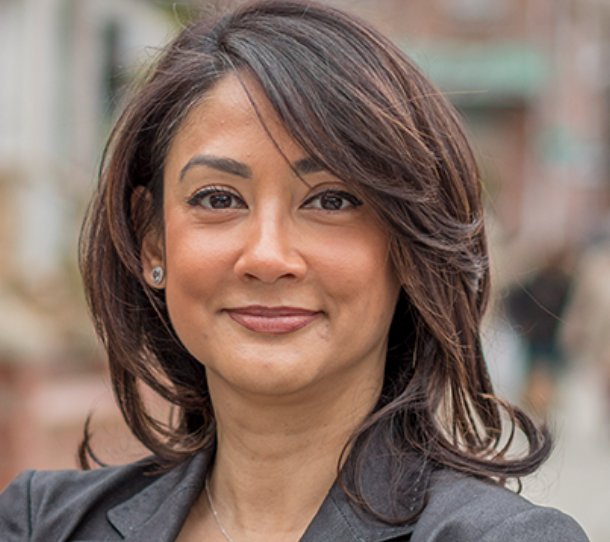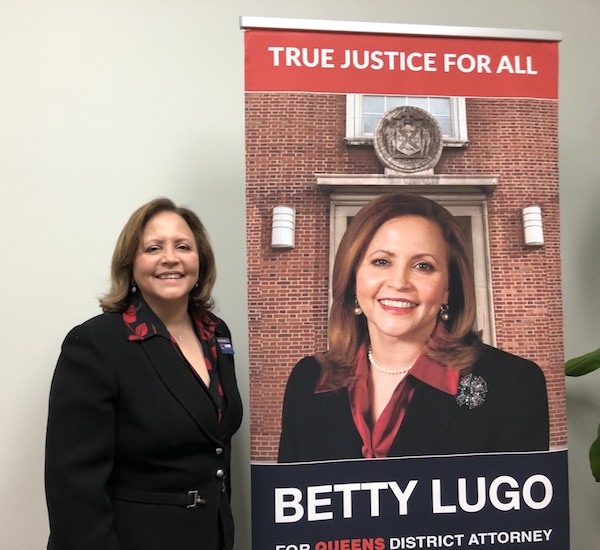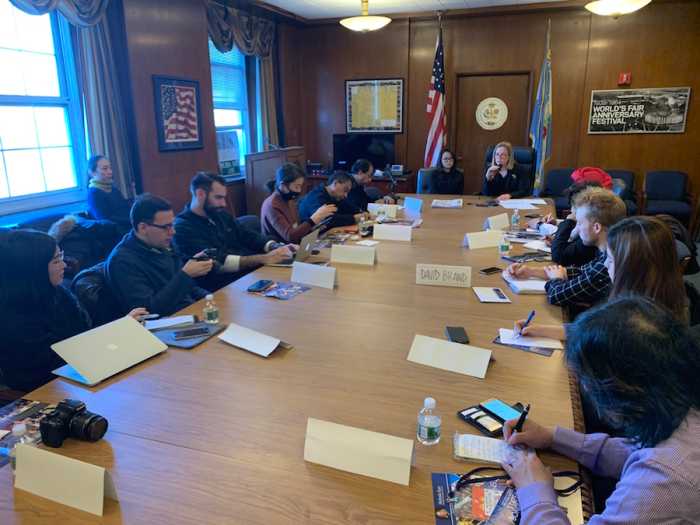The primary for the Queens District Attorney Office is less than two months away and former Washington D.C. attorney general and Harvard lecturer Mina Malik wants to use her experience as a criminal justice reformer in Brooklyn and the U.S. Capitol to bring forth policy changes to the most diverse borough in the nation.
Malik immigrated to the U.S. with her parents in the 1970s and quickly realized when growing up in a basement apartment in Corona that those that enforced the laws around her didn’t look like the people in the neighborhood and she became inspired to make a change.
Her mother is a Filipina Spaniard and her father was born in India and raised in Pakistan, and as union workers they respectively were employed as a registered nurse and a machine operator.
“I have the immigrant experience and I also have the experience of growing up in a community that was overpoliced and prosecuted,” said Malik.
Eventually, her parents were able to save up enough money to buy a house in Elmhurst near Lefrak City.
“I saw so many people in Elmhurst, Corona and Lefrak City get arrested for low-level marijuana possession or low-level drug possession,” said Malik. “That is something I wanted to rectify. “I recognized that sometimes are people are saddle with low-level convictions that do nothing to impact public safety in a positive way, but only impacting them in a negative way by saddling them with a criminal conviction that affects their ability to get a job, get housing, to get a loan and sometimes to even get a license.”
Both Malik and her father were victims of hate crimes.
“I was jumped by a gang when I was a teenager and I spent a week in the hospital with a facial skull fracture and a severe brain concussion and the people who did that to me were never brought to justice or held accountable for their actions,” said Malik. “My father was a dark-skinned Muslim who had an accent and I recall that at 5-years-old I would walk to the corner store with him because I wanted to protect him since each day he was harassed or intimidated and assaulted by a group of young white men that always stood on the corner as he tried to get his newspaper and coffee.”
If she becomes the district attorney she wants the public to know that hate crimes will not be tolerated and fully prosecuted.
“Queens is the most diverse county in the country, if not the entire world and it has a population of 2.4 million, and approximately 50 percent are foreign-born,” said Malik. “We need to make sure that we are aggressively pursuing hate crime and holding people accountable when others are attacked or intimidated because of their sexual orientation, their gender, or their religious beliefs.”
Additionally, if she becomes the district attorney she wants to end cash bail.
“I practiced in a jurisdiction that ended cash bail in Washington D.C. in 1992 and it works,” said Malik. “A recent study showed that 94 percent of people who were accused of a crime who was released, approximately 90 percent of them returned for their court appearance.”
The 90 percent figure is supported by the data from D.C. Department of Corrections.
Malik also wants to stop using jail for crimes committed by those suffering from mental health disorders, substance abuse and/or those who simply turn to crime because of poverty.
“We must deal with the three main root causes of crime with services and treatment,” said Malik. “Then it is less likely for people to recidivate.”
She believes incarcerating people because they are poor, mentally unwell, or face addiction will only exacerbate their problems and lead to more crime.
Malik supports community jails and closing Rikers Island but believes the process should have the input of the public.
“Research shows that community jails are better for people because it keeps people closer to their family, friends and support networks and they are less likely to become disengaged if they have their network close,” said Malik. “What’s important is that there has to be community input as to where the jails will be built and how large the jails will be built.”
Malik doesn’t believe sex workers should be prosecuted, but she also does not support the legalization of sex work.
“I don’t think people who are involved in sex work should be prosecuted,” said Malik. “I think we should be moving towards a model that gets the services and the treatment that they need to get out of the life of prostitution and sex work.”
She believes legalizing sex work could lead to more sex trafficking and exploitation of women.
The queens native also wants to implement an immigration hardship plea policy for undocumented immigrants.
“I want to make sure that we are taking into consideration their status when we are evaluating cases, when we are taking pleas on cases and when we are resolving cases,” said Malik. “We don’t want to affect someone’s status when they make a mistake.”
As a former Special Victims prosecutor for the Queens DA’s Office, Malik tried to help those who were sexually abused, but some were afraid to come forward because of their undocumented status.
“Ultimately, this will have a chilling effect on people reporting crimes and participating in the criminal justice process and that will affect public safety,” said Malik.
During her time under Brooklyn DA Ken Thompson, she helped to create a Conviction Review Unit. She wants to implement a similar unit in Queens.
“When I was at the Brooklyn DA’s Office, there was only one person at the CRU,” said Malik. “I remember suggesting to him that if we really want to have a meaningful CRU we need to have more people with no ties to any of the cases where there are claims of wrongful conviction are being made.”
She made sure that the CRU contained people that had no ties to Brooklyn, no ties to the police officers who investigated previous cases, no ties to judges who oversaw the cases and no ties to the prosecutors who worked on the case.
The team consisted of a director for the CRU, 10 ADAs, three investigators and a support staff person, according to Malik. They received $1.1 million to review cases.
“Since its inception in 2014, we have exonerated 25 wrongfully convicted people in Brooklyn,” said Malik. “I have the lived experience of growing up in communities that have starkly been negatively impacted by our criminal justice system. So I want to serve the county and the people of Queens just as I’ve always done and to make the system fairer and equal for all of us.”









